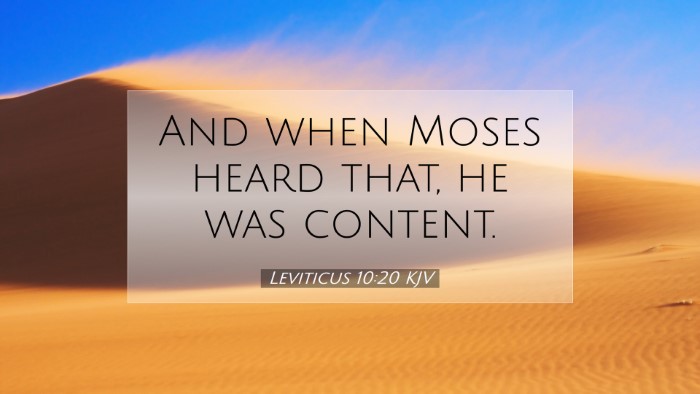Commentary on Leviticus 10:20
Verse Reference: Leviticus 10:20 - "And Aaron held his peace."
Introduction
Leviticus 10:20 captures a profound moment following the tragedy of Nadab and Abihu, Aaron's sons, who offered unauthorized fire before the Lord and subsequently faced divine judgment. This verse serves as a poignant conclusion to a narrative that emphasizes the sanctity of worship and the seriousness of obedience to divine commands.
The Context of Leviticus 10
The chapter begins with the solemn account of Nadab and Abihu, who, in their zeal, transgressed the established protocols for worship. Their death highlighted God's holiness and the inherent dangers of approaching Him in an unworthy manner. The process of Aaron's reaction signifies not just personal loss but also the weight of divine justice and the implications for the Aaronic priesthood.
Importance of Silence
Aaron's silence (holding his peace) is noteworthy. The following insights draw from the commentaries of Matthew Henry, Albert Barnes, and Adam Clarke to elucidate its significance.
-
Matthew Henry:
Henry posits that Aaron's silence reflects a deep reverence for the sovereignty and holiness of God. He suggests that at such a moment of grief and confusion, words would fail to express the profound loss and bewilderment. Rather than question God’s judgment, Aaron chose to accept it silently, evoking a sense of submission and faith.
-
Albert Barnes:
Barnes emphasizes that Aaron's quietness was an act of faith in God’s justice. In the face of personal tragedy, he abstained from lamenting or questioning God's motives, depicting a heart still devoted to God’s plan, even through intense suffering. This posture of acceptance is vital for believers, showing that faith can exist alongside grieving.
-
Adam Clarke:
Clarke infers that Aaron's reticence is a powerful example of humility in the presence of God. He notes that Aaron as the high priest understood the weight of his responsibilities and the call to lead by example. By holding his peace, Aaron not only honored his sons but reinforced the gravity of God's commands to the community, reminding them of the sacredness of priestly duties.
Theological Implications
The act of silence encompasses broader theological themes, worthy of exploration by scholars and theologians.
-
Divine Sovereignty:
Aaron's silence exemplifies a relinquishing of control, acknowledging that God alone understands the bigger picture. It encourages believers to trust God's governance over their lives, especially in suffering.
-
Human Grief and Divine Justice:
The balance between grief over personal loss and reverence for divine justice presents a complex dynamic that many face in their relationship with God. The emotional turmoil experienced by Aaron is a relatable picture for those grappling with sorrow, reinforcing that it is natural to grieve, yet one must maintain faith in God's righteousness.
-
Call to Holiness:
This passage underscores the need for carefulness in spiritual matters. The destructive consequences that befell Nadab and Abihu remind contemporary followers of the seriousness of worship and adhere to God's prescriptions for communal and personal piety.
Application for Pastors and Theologians
For pastors, this verse serves as a critical teaching point regarding the nature of worship and the role of leaders in guiding their congregations through pain and confusion. Emphasizing the importance of reverent silence and acceptance can foster a deeper understanding of God’s holiness in ministry contexts.
For theologians, the theological reflections on Aaron's silence present an avenue for further exploration into the nature of divine justice, human suffering, and the implications of holiness in worship, providing fertile ground for scholarly discourse and application.
Conclusion
Leviticus 10:20, though simple in its declaration, encapsulates profound truths about God’s character and human response. Aaron’s silence speaks volumes about faith during trials, the nature of leadership in faith communities, and the call to maintain purity in worship. As leaders and scholars reflect on this narrative, may it inspire a community of believers who embrace God's holiness with awe and reverence, even amidst strife.


